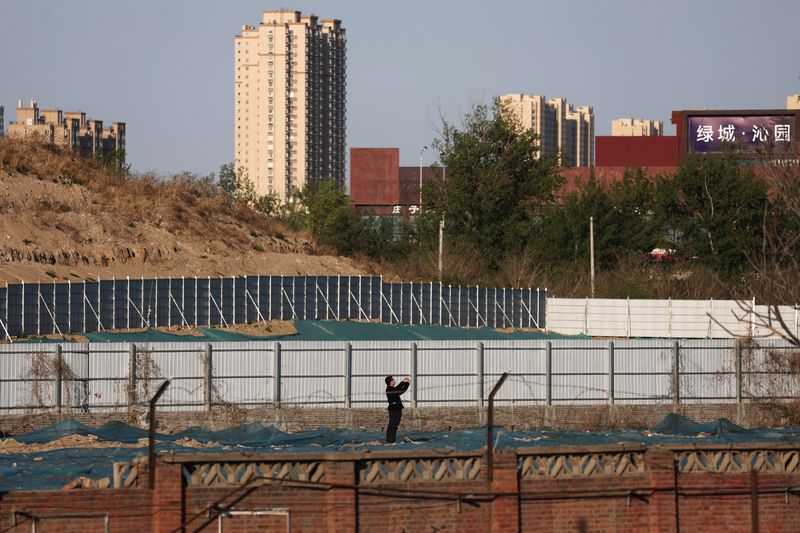
© Reuters. FILE PHOTO: A man walks at a construction site near residential buildings in Beijing, China April 14, 2022. Picture taken April 14, 2022. REUTERS/Tingshu Wang/File Photo
By Liangping Gao and Ryan Woo
BEIJING (Reuters) -China’s new home prices fell for the third straight month in September, official data showed on Thursday, dashing hopes of a turnaround in demand during a traditionally peak home buying period despite efforts to revive the crisis-hit property sector.
New home prices fell 0.2% month-on-month but narrowed from a 0.3% drop in August, according to Reuters calculations based on National Bureau of Statistics (NBS) data. Prices were down 0.1% from a year earlier, matching August’s decline.
China’s property sector, once a key engine of economic growth, has been squeezed by a regulatory crackdown since 2020 as authorities curbed excessive debt, which tightened liquidity and raised default risks for developers.
The home prices data came a day after separate figures showed property sales and investment extended double-digit declines, a sign the world’s second-biggest economy is not out of the woods yet despite upbeat headline gross domestic product data.
China has quickened the pace of policy stimulus in recent weeks, by relaxing borrowing rules and lifting home-purchasing curbs in some cities, in attempts to boost battered buyer sentiment, which analysts say has started to show signs of stabilisation.
“Whether the property market fully recovers depends on the performance in the fourth quarter (Q4), and new home prices may fall slightly for the full year of 2023,” said Ma Hong, senior analyst at Zhixin Investment Research Institute.
September and October are traditionally peak months for new-home sales in China, with developers offering promotions and releasing new properties on to the market.
Of the 70 cities in the home price data, 54 reported declines in prices last month, up from 52 in August.
New home prices in tier-three cities fell 0.3% month-on-month after a 0.4% drop in August.
“The property markets in lower-tier cities still face strong headwinds from weaker growth fundamentals than top-tier cities, including net population outflows and potential oversupply problems,” said Goldman Sachs analysts.
Support policies boosted housing demand in some major cities with new home prices up on month in Beijing and Shanghai. However, demand remained lukewarm in smaller cities struggling with excess supply while nationwide the property sector remains in a deep slump.
New home prices in Shenzhen and Guangzhou extended declines in September. Ma attributed the fall to the fact that Guangdong province is home to many private developers with liquidity problems.
“There is no need for more supportive policies for the sector recovery, and the most urgent issue that needs to be resolved is the effective disposal of the debts of some private developers,” said Ma.
Investors are closely watching Country Garden, China’s biggest private developer, which is also headquartered in Guangdong, for signs of what may come next for the sector.
The grace period for a $15 million coupon payment on a bond issued by the company expired on Wednesday with no word yet of payment.
The problems in China’s real estate sector need to be addressed “head on”, Krishna Srinivasan, director of Asia-Pacific Department at International Monetary Fund, said in a press briefing on Thursday in Mumbai, India.
“They need to come with a strategy for restructuring of the developers, he said.
Srinivasan said that weak consumer confidence in China is linked to the housing market. “People have their wealth in the housing market so that problem has to be addressed head on. We call for a comprehensive strategy that deals with that problem,” he said.








